Ryan Hall's Blog, page 370
August 8, 2015
Canadian Lewis Kent Lowers Beer Mile WR to 4:55.8
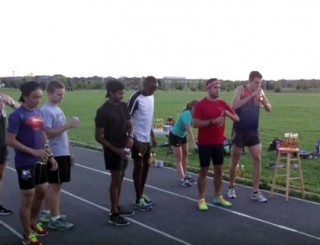
Canadian Lewis Kent (far right) set a new beer mile world record of 4:55.8 on Aug. 7.
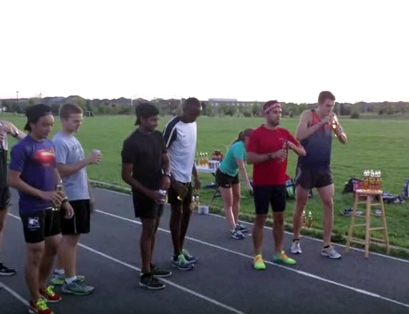
Canadian Kent Lewis (far right) set a new beer mile world record of 4:55.8 on Aug. 7.
The beer mile competition is getting serious! Less than 24 hours after Australian Josh Harris broke the world record with a 4:56.2, Canadian Lewis Kent ran a 4:55.8 on Aug. 7. Both results are pending verification by beermile.com.
Kent’s splits were roughly 0:70, 2:28 and 3:43 while chugging four 12-oz beers before each lap of the four laps around the track.
Kent is one of several runners training for the Beer Mile Classic on Aug. 22 in San Francisco.
Video: Lewis Kent Runs 4:55.8 Beer Mile
RELATED:
— Beer Mile World Classic Set For Aug. 22
— James Nielsen—Beer Mile Legend
The post Canadian Lewis Kent Lowers Beer Mile WR to 4:55.8 appeared first on Competitor.com.
August 7, 2015
Angela Bekkala: Signs of Overtraining and How to Avoid It

Photo: Shutterstock.com
When I first got serious about running, I lived and breathed by my training plan. Whatever it said to do, I did. The thought of overtraining never entered my thoughts. How could it? If I was following a training plan, there is no way I should be over doing it. The plan followed the rules of progression overload so my mileage didn’t jump up too fast or too much.
After what seemed like an endless week of consistently hard effort workouts, even on my easy runs, I realized it wasn’t that I had suddenly become bad at running. Instead, I was a classic example of overtraining.
Marathon training is definitely hard work. You are constantly breaking down and building up new muscle fibers with every run. Of course, you are going to feel tired and sore. But there’s a difference between general soreness and overtraining.
Here are 12 warning signs from your body that you are overtraining:
Feeling exhausted, even after getting enough sleep
Heavy legs before, during and after runs
Emotional highs and lows
Appetite changes
Consistently higher resting heart rates
Lack of motivation for usual workouts
Easy workouts consistently feel harder than usual
Persistent achiness, stiffness, or pain in the muscles and/or joints (beyond the typical delayed onset muscle soreness felt after a workout)
Frequent headaches
Drop in athletic performance
Not able to complete your normal workout
Lowered immune system
So what can you do to ensure you don’t fall into the overtraining trap?
Do follow a 10 to 20 percent increase in training volume over a three- to four-week period
Do one high intensity training session per week.
Don’t do back-to-back challenging workouts.
Do make rest and recovery days/weeks a priority.
Do control your personal stressors.
Do make sleep a big priority.
Do make good nutritional choices before, during or immediately after workouts.
Overtraining can be corrected by recognizing the early symptoms. During a recovery day or week, you need to ensure your body is given enough time to rebuild. Recovery is just as essential to a training plan as a long run, tempo or speed session. If you do feel that you are showing signs of overtraining, skipping a few workouts won’t kill your fitness levels. But it will prevent you from sliding into deeper trouble.
And remember, running is something you get to do, not something you have to do.
The post Angela Bekkala: Signs of Overtraining and How to Avoid It appeared first on Competitor.com.
10 Things That Could Go Wrong On Race Day
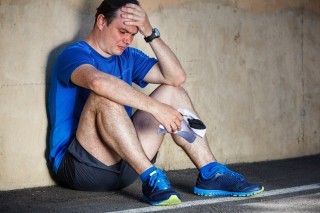
We do everything within our power to ensure that race day will be perfect. We lay out our race kit the night before, including all the bars, chews, GUs, electrolyte mixes for fuel. We make sure to eat a decent dinner and breakfast that won’t rile up our stomachs at mile 5. We get a good night’s sleep and set four different alarms so we’re up at least 3 hours before the race starts. But sometimes, despite all the prep work, the race gods are against us, it’s just not our day and well…sh*t happens (sometimes literally). Whether we can control it or not, here are 10 race day mishaps to avoid (or commiserate in).
Photos: Shutterstock.com
Photo Gallery
1 of {count}
Back to Start
View Larger Image

1. Forgetting your race chip or bib
One of the worst "oh sh*t" moments is standing in your race corral only to notice you're missing something everyone is proudly sporting on their chests…your race bib (which often has the race chip attached to it too)! At this point, it's too late to go back and grab it, and you've trained too hard to quit, so you run it anyway (probably worried that everyone thinks you're a bandit). Your name won't appear in the results and there will be no official proof that you ran it. Hopefully you wore a watch in case you clocked a PR!
View Larger Image

2. Getting stuck in the porta potty
Your cup (or two) of morning coffee is kicking in and you either 1. Commit public indecent exposure or 2. Shuffle in line for the porta-potty minutes before the start, praying that it moves quickly. You're finally in when you hear the gun go off…
View Larger Image

3. Dropping your sunglasses in the porta-potty in a rush to get out (see #2)
"I heard some guy remark about it before the Chicago Marathon one year and I could only laugh," says editor-in-chief Brian Metzler. "However, it has come close to happening to me a couple of times and I'm always freaked out about anything I take into a porta potty—keys, wallet, sunglasses—because if they fall down the hole, I'm definitely not fishing them out."
View Larger Image

4. GPS watch doesn't kick in until mile 2
At large races, this can be a potential problem. Everyone is turning on and setting up their watches 5 minutes before the race. Right when you think you're all set, you notice your watch isn't finding the satellites—or amid all the excitement, you forgot to press start.
View Larger Image

5. Forgetting to wear race shorts underneath your sweats
"This happened to a friend of mine," says editor-in-chief Brian Metzler. "We were at the start of a cool morning race and he's about to drop his pre-race sweats when he realizes he doesn't have any running shorts on. He wound up cutting his sweats into shorts. He looked like a dork with cut-off sweats, but he ran OK."
View Larger Image

6. The buses forget to show up
Recently at the Revel Rockies Half Marathon in Morrison, Colo., 1,700 runners were left waiting in the parking lot because the buses shuttling participants to the start line forgot to show up. Only enough buses to transport 900 marathoners and 100 half marathoners to the start line were available. It's one thing for a race to be cancelled for everybody, but getting left behind is truly unfortunate.
View Larger Image

7. Luggage gets lost traveling to a race
Another reason to carry on your bag during a run-cation, so you have exactly what you need for race day. Sure, you can buy new running clothes and shoes, but breaking in new shoes on race day is not ideal nor is it particularly pleasant. Hello blisters!
View Larger Image

8. Getting lost yourself
Although not very common during road races, trail and ultrarunners on courses with little to no marking have accidentally ran several miles in the wrong direction. Even elite ultrarunner Hal Koerner admits to getting lost more than just a few times, "I've had so many races where I'm running down the trail fast in first place, thinking 'Oh my god, I'm killing this race.' Only to find out miles later that I'm not even on the right course!"
View Larger Image

9. Earphones blow out
If you're someone that must have music while you run, then this is the worst thing that could happen to you during a race. It throws off your groove and suddenly 13.1 or 26.2 miles is looking a lot longer than it usually does.
View Larger Image

10. Pooping your pants
You know those signs that read, "It's OK, you can poop" or "Don't poop!" Well, it can really happen and sometimes you really just can't hold it. Embrace it. Photo: Bestracesigns.wordpress.com

More Galleries
The post 10 Things That Could Go Wrong On Race Day appeared first on Competitor.com.
Jenny Simpson’s Return to the World Championships Documented in New Series

Jenny Simpson won gold in the 1,500m at the 2011 IAAF World Championships in Daegu, South Korea. Two years later at the 2013 Worlds in Russia, she lost her title by .32 seconds. As the new series by New Balance points out, “When it’s all you think about, 1/3 of a second lasts a long time.”
New Balance has put together a four-part documentary on Simpson as she prepares for the 2015 World Championships later this month in Beijing, China. You can see the first episode of “Steps to Beijing” above.
The film was produced by NAIL out of Providence, R.I., and directed by Emmy Award winning Tiny Elephant, which was founded by Jeffrey DeChausse.
RELATED: Why I Run: Jenny Simpson
The post Jenny Simpson’s Return to the World Championships Documented in New Series appeared first on Competitor.com.
Josh Harris Sets New Beer Mile World Record In Australia

On Friday, Australian Josh Harris clocked a 4:56.25 beer mile, breaking the existing world record set last year by James Nielsen. Harris’ splits were 70, 2:27 and 3:45, sandwiched between the chugging of four 12-ounce beers. He closed his final quarter-mile in 71 seconds to break the record. Acceptance of Harris’ mark is pending verification by beermile.com.
“New world record baby,” Harris said upon crossing the finish line. “World Beer Mile Classic (which takes place on August 22 in San Francisco) here we come.”
RELATED:
— Beer Mile World Classic Set For Aug. 22
— James Nielsen—Beer Mile Legend
The post Josh Harris Sets New Beer Mile World Record In Australia appeared first on Competitor.com.
WADA Launching Investigation Into Doping Claims
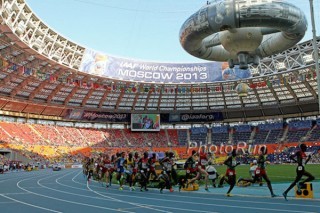
Photo: PhotoRun.net
Following last week’s report by German broadcaster ARD that a third of all the medalists in the distance events at the Olympic Games and World Championships from 2001-2012 had blood values that were “highly suggestive of doping or at the very least abnormal”—a claim based on information that was leaked from an International Association of Athletics Federations database of 12,000 blood tests from 5,000 athletes—the World Anti-Doping Agency announced on Friday it is launching an immediate investigation into widespread doping allegations in track & field.
RELATED: Liliya Shobukhova Officially Loses Chicago, London Marathon Titles
“WADA is committed to protecting the confidentiality of athletes; and, therefore, has asked its Independent Commission to commence its investigation with urgency,” WADA President Sir Craig Reedie said in a release. “We are confident that the IAAF, which has formally agreed to full cooperation with the Commission with respect to its inquiries, is equally committed.”
Earlier this week, the IAAF, which vehemently denies covering up any wrongdoing and refutes suggestions of incompetence, responded that the allegations were “sensationalist and confusing.” The organization’s acting vice president, four-time Olympic medalist Sebastian Coe, took the allegations as “a declaration of war on my sport. I take pretty grave exception to that. This, for me, is a fairly seminal moment. There is nothing in our history of competence and integrity in drug testing that warrants this kind of attack. We should not be cowering. We should come out fighting.”
The ARD documentary, which was aired just three weeks before the IAAF World Championships are set to kick off in Beijing on August 22, alleges that blood doping was rampant in track & field, and focuses on events from 800 meters to the marathon. In the film, Australian doping experts Michael Ashenden and Robin Parisotto concluded that 800 of 5,000 athletes in question had “suspicious” blood values, a total that includes 55 gold medalists and 150 medal winners.
The results of the investigation are due to WADA’s president by the end of the year, unless it’s deemed appropriate to extend the mandate, according to the release.
The post WADA Launching Investigation Into Doping Claims appeared first on Competitor.com.
August 6, 2015
Nutrition Tweaks for Half-Marathon Training

Photo: Shutterstock.com
This article first appeared in Women’s Running.
After starting to run in January, Stacy Mahoney crossed her first finish line at a Hot Chocolate 15K in March. Now the San Diego-based nurse has hit “register” for a half marathon. But how does a newbie safely up her run game to complete the big 13.1? We asked a nutritionist to take a look at Stacy’s diet and help create the perfect half marathon meal plan.
A runner herself, Anna Robertson is a nutritionist at Biodynamic Wellness in California where she’s worked with many runners on their nutrition regimens during training.
STACY’S QUESTION: Based on what I’ve been eating, how do I change my caloric intake and diet for the increase in mileage? Here’s what a current day looks like for my diet…
WAKE UP: Cup of coffee with cream and sugar
BREAKFAST: Cheerios with 2 percent milk
ANNA’S SOLUTION: Enjoy coffee and cream with your meal and try adding honey or maple syrup as a natural sweetener. Start the morning off with a good source of protein. Two or three scrambled eggs cooked in coconut oil make for a nourishing breakfast that incorporates a healthy source of protein and fat.
LUNCH: Two scrambled eggs with ham
ANNA’S SOLUTION: A salad with protein, veggies and a slice of toasted whole-grain bread would be optimal!
PRE-RUN SNACK: Fig bar
ANNA’S SOLUTION: Always reach for real food as it will be more bio-available. Grab a handful of trail mix. The nuts and dried fruit are great sources of carbohydrates for quick fuel. For a 10-mile day, almond butter and an apple will provide carbohydrates and fat, which is the body’s preferred source of long-sustaining fuel.
RUN: 3 miles
ANNA’S SOLUTION: For longer runs, the addition of electrolytes to your water will be huge in recovering promptly and staying hydrated. I love to simply add a pinch of Celtic Sea Salt to my water, which provides naturally occurring minerals to rehydrate the body.
POST-RUN SNACK: Multigrain chips
ANNA’S SOLUTION: Increase your protein consumption and refuel within 30 minutes of running. For a 6-miler, add an apple paired with a healthy fat, like cheese or almond butter. This will help to replenish amino acid stores needed for your muscles, and the fruit and fat combination will increase blood glucose levels to provide energy for your cells. For a 10-mile day, have a mini meal including protein, fat and carbs. Egg or tuna salad on a slice of whole-grain toast is fast and easy to whip up.
DINNER: 1/2 pork chop with steamed carrots, kale, white rice and two glasses of white wine
ANNA’S SOLUTION: This looks good. For dinner, you should always think: protein, fat, carb. The best sources for protein are animal-derived, as they will be the most nutrient dense. Healthy fats include coconut oil, butter, avocado and extra-virgin olive oil. Try brown rice, quinoa or sweet potatoes as a substitute for white rice.
SNACK: 2 fun-size Twizzlers
ANNA’S SOLUTION: Enjoy a handful of blueberries, which contain antioxidants to help clean-sweep free radicals in the body. Berries support detoxification all the while giving that sweet fix! If you ran 6 miles or longer, enjoy a square of 75 percent dark chocolate as well.
Anna’a Best Tip: Always sip on water throughout the day. Aim for drinking half your body weight in fluid ounces.
The post Nutrition Tweaks for Half-Marathon Training appeared first on Competitor.com.
First Look: Altra IQ, the High-Tech Shoe
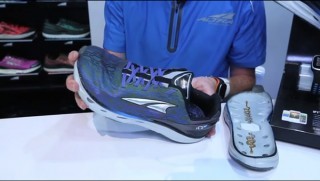
The groundbreaking Altra IQ shoe, slated for a spring 2016 release, features a multi-sensored system within the length of the midsole that can sync your shoes to your smartphone and give you valuable data about footstrike, cadence and more.
In this video, Altra founder Golden Harper explains the shoe’s features and functionality.
RELATED: Out There: The Madness of Outdoor Retailer
The post First Look: Altra IQ, the High-Tech Shoe appeared first on Competitor.com.
Liliya Shobukhova Officially Loses Chicago, London Marathon Titles
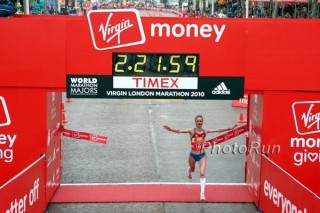
Shobukhova winning the 2010 London Marathon. Photo: PhotoRun.net
Disgraced Russian marathoner Liliya Shobukhova is officially no longer the 2009, 2010 or 2011 Chicago Marathon champion, nor is she the 2010 London Marathon champion.
The marathons were informed by the IAAF that Shobukhova has officially received a doping ban based on findings from her biological passport. The IAAF disqualified all of her results after Oct. 9, 2009—just before her phenomenal run at the World Marathon Majors events started.
The Chicago Marathon said Thursday they will “begin taking steps to annul” her results from the 2009-2012 races (she finished fourth in 2012). But it’s not just the official results that are dinging Shobukhova—the races and the World Marathon Majors series want their prize money back too, according to the Chicago Tribune. She won $1 million for winning the World Marathon Majors series in 2009-2010. Also, the Chicago Tribune reports that Shobukhova won $265,000 in placement prize money and another $90,000 in time bonuses from 2009-2012 Chicago Marathons, and the race wants that money back.
“In accordance with IAAF rule 40.8, the Chicago Marathon will not be responsible for retroactively paying athletes and re-allocating the prize money unless or until Shobukhova repays all of her prize money,” Chicago Marathon organizers said in a statement.
News of an abnormality in Shobukhova’s biological passport surfaced last year, and then reports surfaced that she paid money to avoid a doping suspension before the 2012 London Olympics.
The post Liliya Shobukhova Officially Loses Chicago, London Marathon Titles appeared first on Competitor.com.
Symmonds, USATF At Odds Over Sponsorship Dispute
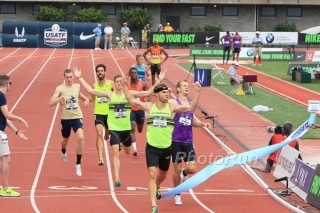
Nick Symmonds, shown here winning the 800m at the U.S. Track & Field Championships in June, says he will sue USA Track & Field if he is left off the national team for this month's world championships. Photo: PhotoRun.net
Two-time Olympian Nick Symmonds, who won his sixth national 800m championship in June, is refusing to sign a contract that mandates he must wear Nike-branded gear during all team functions at the IAAF World Championships in Beijing later this month, according to a report by Sports Business Daily. In April, Nike signed a longterm partnership deal with USA Track & Field which extends through 2040, maintaining its status as exclusive sponsor and supplier of products for U.S. national teams at international competitions such as the Olympics, world championships, Pan-Am Games and other events.
Symmonds, who is sponsored by Brooks Running, Soleus Watches, Run Gum (which he founded and owns) and other companies, is threatening to sue USATF if he is kept off the world championship team for refusing to sign the aforementioned contract. USA Track & Field says he has until Sunday to sign, or he will be left off the team.
RELATED VIDEO: Why I Run—Nick Symmonds
Symmonds told Sports Business Daily that he will wear the Team USA Nike uniform while competing, but says the contract wants Nike purity on bandanas, travel bags, socks and more. Symmonds posted a congratulatory letter from USA Track & Field on his Instagram account that reads, “Accordingly, please pack ONLY Team USA, Nike or non-branded apparel and be sure to bring your Team USA gear.”
“My concern is that … how far back can they go?,” Symmonds told SBD’s Ben Fischer. “If they wanted to, they could say I have to wear Nike from the moment that I make the team at USAs, and then all of a sudden they’re buying up the entire season. USATF and Nike are just taking way too much of the pie, so far as to violate my rights as an athlete.”
This isn’t the first time that Symmonds, who was a Nike-sponsored athlete until he signed with Brooks in early 2014, has created controversy surrounding branding and sponsorship. Leading up to the 2012 U.S. Olympic Trials, Symmonds sold advertising space on his shoulder to Milwaukee-based advertising agency Hanson Dodge Creative, but was forced to cover up the temporary tattoo during competition or risk disqualification. At this year’s national championships in June, Symmonds broke the finish line tape in the 800m flexing his biceps, adorned with Run Gum temporary tattoos. That image graces the September cover of Track & Field News.
USA Track & Field spokeswoman Jill Geer stated that the national team uniform policy is well known and consistent with the rest of the industry. That answer didn’t satisfy Symmonds, who says, “My end game is to see that this document is rewritten and stops exploiting athletes.”
RELATED: Nick Symmonds’ 4-Week Strength Training Plan
The post Symmonds, USATF At Odds Over Sponsorship Dispute appeared first on Competitor.com.
Ryan Hall's Blog
- Ryan Hall's profile
- 21 followers



